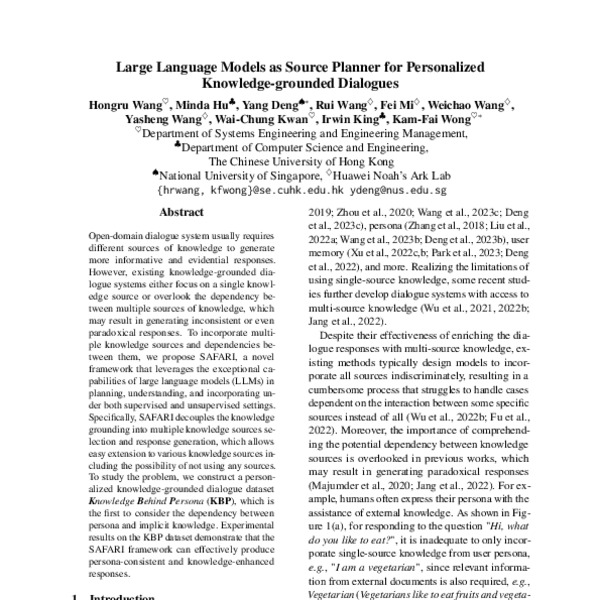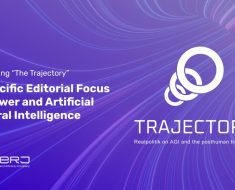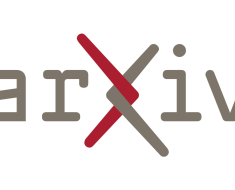
@inproceedings{wang-etal-2023-large,
title = "Large Language Models as Source Planner for Personalized Knowledge-grounded Dialogues",
author = "Wang, Hongru and
Hu, Minda and
Deng, Yang and
Wang, Rui and
Mi, Fei and
Wang, Weichao and
Wang, Yasheng and
Kwan, Wai-Chung and
King, Irwin and
Wong, Kam-Fai",
editor = "Bouamor, Houda and
Pino, Juan and
Bali, Kalika",
booktitle = "Findings of the Association for Computational Linguistics: EMNLP 2023",
month = dec,
year = "2023",
address = "Singapore",
publisher = "Association for Computational Linguistics",
url = "https://aclanthology.org/2023.findings-emnlp.641",
doi = "10.18653/v1/2023.findings-emnlp.641",
pages = "9556--9569",
abstract = "Open-domain dialogue system usually requires different sources of knowledge to generate more informative and evidential responses. However, existing knowledge-grounded dialogue systems either focus on a single knowledge source or overlook the dependency between multiple sources of knowledge, which may result in generating inconsistent or even paradoxical responses. To incorporate multiple knowledge sources and dependencies between them, we propose SAFARI, a novel framework that leverages the exceptional capabilities of large language models (LLMs) in planning, understanding, and incorporating under both supervised and unsupervised settings. Specifically, SAFARI decouples the knowledge grounding into multiple sources and response generation, which allows easy extension to various knowledge sources including the possibility of not using any sources. To study the problem, we construct a personalized knowledge-grounded dialogue dataset Knowledge Behind Persona (KBP), which is the first to consider the dependency between persona and implicit knowledge. Experimental results on the KBP dataset demonstrate that the SAFARI framework can effectively produce persona-consistent and knowledge-enhanced responses.",
}
<?xml version="1.0" encoding="UTF-8"?>
<modsCollection xmlns="http://www.loc.gov/mods/v3">
<mods ID="wang-etal-2023-large">
<titleInfo>
<title>Large Language Models as Source Planner for Personalized Knowledge-grounded Dialogues</title>
</titleInfo>
<name type="personal">
<namePart type="given">Hongru</namePart>
<namePart type="family">Wang</namePart>
<role>
<roleTerm authority="marcrelator" type="text">author</roleTerm>
</role>
</name>
<name type="personal">
<namePart type="given">Minda</namePart>
<namePart type="family">Hu</namePart>
<role>
<roleTerm authority="marcrelator" type="text">author</roleTerm>
</role>
</name>
<name type="personal">
<namePart type="given">Yang</namePart>
<namePart type="family">Deng</namePart>
<role>
<roleTerm authority="marcrelator" type="text">author</roleTerm>
</role>
</name>
<name type="personal">
<namePart type="given">Rui</namePart>
<namePart type="family">Wang</namePart>
<role>
<roleTerm authority="marcrelator" type="text">author</roleTerm>
</role>
</name>
<name type="personal">
<namePart type="given">Fei</namePart>
<namePart type="family">Mi</namePart>
<role>
<roleTerm authority="marcrelator" type="text">author</roleTerm>
</role>
</name>
<name type="personal">
<namePart type="given">Weichao</namePart>
<namePart type="family">Wang</namePart>
<role>
<roleTerm authority="marcrelator" type="text">author</roleTerm>
</role>
</name>
<name type="personal">
<namePart type="given">Yasheng</namePart>
<namePart type="family">Wang</namePart>
<role>
<roleTerm authority="marcrelator" type="text">author</roleTerm>
</role>
</name>
<name type="personal">
<namePart type="given">Wai-Chung</namePart>
<namePart type="family">Kwan</namePart>
<role>
<roleTerm authority="marcrelator" type="text">author</roleTerm>
</role>
</name>
<name type="personal">
<namePart type="given">Irwin</namePart>
<namePart type="family">King</namePart>
<role>
<roleTerm authority="marcrelator" type="text">author</roleTerm>
</role>
</name>
<name type="personal">
<namePart type="given">Kam-Fai</namePart>
<namePart type="family">Wong</namePart>
<role>
<roleTerm authority="marcrelator" type="text">author</roleTerm>
</role>
</name>
<originInfo>
<dateIssued>2023-12</dateIssued>
</originInfo>
<typeOfResource>text</typeOfResource>
<relatedItem type="host">
<titleInfo>
<title>Findings of the Association for Computational Linguistics: EMNLP 2023</title>
</titleInfo>
<name type="personal">
<namePart type="given">Houda</namePart>
<namePart type="family">Bouamor</namePart>
<role>
<roleTerm authority="marcrelator" type="text">editor</roleTerm>
</role>
</name>
<name type="personal">
<namePart type="given">Juan</namePart>
<namePart type="family">Pino</namePart>
<role>
<roleTerm authority="marcrelator" type="text">editor</roleTerm>
</role>
</name>
<name type="personal">
<namePart type="given">Kalika</namePart>
<namePart type="family">Bali</namePart>
<role>
<roleTerm authority="marcrelator" type="text">editor</roleTerm>
</role>
</name>
<originInfo>
<publisher>Association for Computational Linguistics</publisher>
<place>
<placeTerm type="text">Singapore</placeTerm>
</place>
</originInfo>
<genre authority="marcgt">conference publication</genre>
</relatedItem>
<abstract>Open-domain dialogue system usually requires different sources of knowledge to generate more informative and evidential responses. However, existing knowledge-grounded dialogue systems either focus on a single knowledge source or overlook the dependency between multiple sources of knowledge, which may result in generating inconsistent or even paradoxical responses. To incorporate multiple knowledge sources and dependencies between them, we propose SAFARI, a novel framework that leverages the exceptional capabilities of large language models (LLMs) in planning, understanding, and incorporating under both supervised and unsupervised settings. Specifically, SAFARI decouples the knowledge grounding into multiple sources and response generation, which allows easy extension to various knowledge sources including the possibility of not using any sources. To study the problem, we construct a personalized knowledge-grounded dialogue dataset Knowledge Behind Persona (KBP), which is the first to consider the dependency between persona and implicit knowledge. Experimental results on the KBP dataset demonstrate that the SAFARI framework can effectively produce persona-consistent and knowledge-enhanced responses.</abstract>
<identifier type="citekey">wang-etal-2023-large</identifier>
<identifier type="doi">10.18653/v1/2023.findings-emnlp.641</identifier>
<location>
<url>https://aclanthology.org/2023.findings-emnlp.641</url>
</location>
<part>
<date>2023-12</date>
<extent unit="page">
<start>9556</start>
<end>9569</end>
</extent>
</part>
</mods>
</modsCollection>
%0 Conference Proceedings %T Large Language Models as Source Planner for Personalized Knowledge-grounded Dialogues %A Wang, Hongru %A Hu, Minda %A Deng, Yang %A Wang, Rui %A Mi, Fei %A Wang, Weichao %A Wang, Yasheng %A Kwan, Wai-Chung %A King, Irwin %A Wong, Kam-Fai %Y Bouamor, Houda %Y Pino, Juan %Y Bali, Kalika %S Findings of the Association for Computational Linguistics: EMNLP 2023 %D 2023 %8 December %I Association for Computational Linguistics %C Singapore %F wang-etal-2023-large %X Open-domain dialogue system usually requires different sources of knowledge to generate more informative and evidential responses. However, existing knowledge-grounded dialogue systems either focus on a single knowledge source or overlook the dependency between multiple sources of knowledge, which may result in generating inconsistent or even paradoxical responses. To incorporate multiple knowledge sources and dependencies between them, we propose SAFARI, a novel framework that leverages the exceptional capabilities of large language models (LLMs) in planning, understanding, and incorporating under both supervised and unsupervised settings. Specifically, SAFARI decouples the knowledge grounding into multiple sources and response generation, which allows easy extension to various knowledge sources including the possibility of not using any sources. To study the problem, we construct a personalized knowledge-grounded dialogue dataset Knowledge Behind Persona (KBP), which is the first to consider the dependency between persona and implicit knowledge. Experimental results on the KBP dataset demonstrate that the SAFARI framework can effectively produce persona-consistent and knowledge-enhanced responses. %R 10.18653/v1/2023.findings-emnlp.641 %U https://aclanthology.org/2023.findings-emnlp.641 %U https://doi.org/10.18653/v1/2023.findings-emnlp.641 %P 9556-9569
Markdown (Informal)
[Large Language Models as Source Planner for Personalized Knowledge-grounded Dialogues](https://aclanthology.org/2023.findings-emnlp.641) (Wang et al., Findings 2023)
ACL
- Hongru Wang, Minda Hu, Yang Deng, Rui Wang, Fei Mi, Weichao Wang, Yasheng Wang, Wai-Chung Kwan, Irwin King, and Kam-Fai Wong. 2023. Large Language Models as Source Planner for Personalized Knowledge-grounded Dialogues. In Findings of the Association for Computational Linguistics: EMNLP 2023, pages 9556–9569, Singapore. Association for Computational Linguistics.



